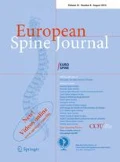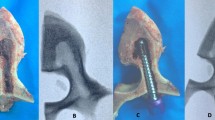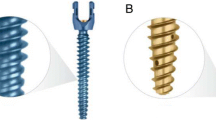Abstract
A lot of new implant devices for spine surgery are coming onto the market, in which vertebral screws play a fundamental role. The new screws developed for surgery of spine deformities have to be compared to established systems. A biomechanical in vitro study was designed to assess the bone–screw interface fixation strength of seven different screws used for correction of scoliosis in spine surgery. The objectives of the current study were twofold: (1) to evaluate the initial strength at the bone–screw interface of newly developed vertebral screws (Universal Spine System II) compared to established systems (product comparison) and (2) to evaluate the influence of screw design, screw diameter, screw length and bone mineral density on pullout strength. Fifty-six calf vertebral bodies were instrumented with seven different screws (USS II anterior 8.0 mm, USS II posterior 6.2 mm, KASS 6.25 mm, USS II anterior 6.2 mm, USS II posterior 5.2 mm, USS 6.0 mm, USS 5.0 mm). Bone mineral density (BMD) was determined by quantitative computed tomography (QCT). Failure in axial pullout was tested using a displacement-controlled universal test machine. USS II anterior 8.0 mm showed higher pullout strength than all other screws. The difference constituted a tendency (P = 0.108) when compared to USS II posterior 6.2 mm (+19%) and was significant in comparison to the other screws (+30 to +55%, P < 0.002). USS II posterior 6.2 mm showed significantly higher pullout strength than USS 5.0 mm (+30%, P = 0.014). The other screws did not differ significantly in pullout strength. Pullout strength correlated significantly with BMD (P = 0.0015) and vertebral body width/screw length (P < 0.001). The newly developed screws for spine surgery (USS II) show higher pullout strength when compared to established systems. Screw design had no significant influence on pullout force in vertebral body screws, but outer diameter of the screw, screw length and BMD are good predictors of pullout resistance.







Similar content being viewed by others
References
Alobaid A, Arlet V, Busato A et al (2005) Pull-out strength of the suprapedicle claw construct: a biomechanical study. Eur Spine J 14:759–764
Bai B, Kummer FJ, Spivak J (2001) Augmentation of anterior vertebral body screw fixation by an injectable, biodegradable calcium phosphate bone substitute. Spine 26:2679–2683
Breeze SW, Doherty BJ, Noble PS et al (1998) A biomechanical study of anterior thoracolumbar screw fixation. Spine 23:1829–1831
Brantley AGU, Mayfield JK, Koenemann JB et al (1994) The effects of pedicle screw fit: an in vitro study. Spine 19:1752–1758
Cotterill PC, Kostuik JP, D`Angelo G et al (1986) An anatomical comparison of the human and bovine thorakolumbar spine. J Orthopaedic Res 4:298–303
Dwyer AF, Newton NC, Sherwood AA (1969) An anterior approach to scoliosis: a preliminary report. Clin Orthop 62:191–202
Eysel P, Schwitalle M, Oberstein A et al (1998) Preoperative estimation of screw fixation strength in vertebral bodies. Spine 23:174–180
Farcy JP, Weidenbaum M, Michelsen CB et al (1987) A comparative biomechanical study of spinal fixation using Cotrel-Dubousset instrumentation. Spine 12:877–881
Ferguson SJ, Winkler F, Nolte LP (2002) Anterior fixation in the osteoporotic spine: cut-out and pullout characteristics of implants. Eur Spine J 11:527–534
Frandsen PA, Christofferson H, Madsen T (1984) Holding Power of different screws in the femoral head. Acta Othop 55:349–351
Gaines RW, Carson WL, Satterlee CC et al (1991) Experimental evaluation of seven different spinal fracture internal fixation devices using nonfailure stability testing. Spine 16:902–909
Gilbert SG, Johns PC, Chow DC et al (1993) Relation of vertebral bone screw axial pullout strength to quantitative computed tomographic trabecular bone mineral content. J Spinal Disord 6:513–521
Gurr KR, McAfee PC, Shih CM (1988) Biomechanical analysis of posterior instrumentation systems after decompressive laminectomy: an unstable calf-spine model. J Bone Joint Surg Am 70:680–691
Gurwitz GS, Dawson JM, McNamara MJ et al (1993) Biomechanical analysis of three surgical approaches for lumbar burst fractures using short-segment instrumentation. Spine 18:977–982
Hackenberg L, Clahsen H, Halm H (1998) Influencing factors on the holding-power of spine surgery screws—experimental examninations. Z Orthop Ihre Grenzgeb 136:451–456
Halvorson TL, Kelley LA, Thomas KA et al (1994) Effects of bone mineral density on pedicle screw fixation. Spine 19:2415–2420
Hopf C, Eysel P, Dubousset J (1995) CDH—first report on a new primary stable anterior spine instrumentation. Z Orthop Ihre Grenzgeb 133:274–281
Horton WC, Blackstock SF, Norman JT et al (1996) Strength of fixation of anterior vertebral body screws. Spine 21:439–444
Hughes AN, Jordan BA (1972) The mechanical properties of surgical bone screws and some aspects of insertions practice. Injury 4:25–37
Jordan BA, Hughes AN (1978) A review of the factors affecting design, specification and material selection of screws for use in orthopedic surgery. Eng Med 7:114–123
Kaneda K, Shono Y, Satoh S et al (1996) New anterior instrumentation for the management of thoracolumbar and lumbar scoliosis: application of the Kaneda two-rod system. Spine 21:1250–1262
Korovessis PG, Deligianni D, Stamakis M et al (1998) Augmentation of anterior transvertebral screws using threaded teflon anchoring. J Spinal Disord 11:300–306
Kumano K, Hirabayasi S, Ogawa Y et al (1994) Pedicle screws and bone mineral density. Spine 19:1157–1161
Liebermann IH, Khazim R. Woodside T (1998) Anterior vertebral body screw pullout testing. A comparison of Zielke, Kaneda, Universal Spine System, and Universal Spine System with pullout-resistant nut. Spine 23:908–910
Lim TH, An HS, Evanich C et al (1995) Strength of anterior vertebral screw fixation in relationship to bone mineral density. J Spinal Disord 8:121–125
Lim TH, An HS, Hong JH et al (1997) Biomechanical Evaluation of anterior and posterior fixations in an unstable calf spine model. Spine 22:261–266
Lin LC, Chen HH, Sun SP (2003) A biomechanical study of the cortex anchorage vertebral screw. Clin Biomech 18:25–32
Mosekilde L, Mosekilde L, Danielsen CC (1987) Biomechanical competence of vertebral trabecular bone in relation to ash density and age in normal individuals. Bone 8:79–86
Nunamaker DM, Perren SM (1976) Force measurement in screw fixation. J Biomech 9:669–675
Ogon M, Haid C, Krismer M et al (1996) Comparison between single-screw and triangulated, double-screw fixation in anterior spine surgery. Spine 21:2728–2734
Okuyama K, Sato K, Abe E et al (1993) Stability of transpedicle screwing for the osteoporotic spine. Spine 18:2240–2245
Pfeiffer M, Gilbertson LG, Goel VK et al (1996) Effect of specimen fixation method on pullout tests of pedicle screws. Spine 21:1037–1044
Pitzen T, Barbier D, Tintinger F et al (2002) Screw fixation to the posterior cortical shell does not influence peak torque and pullout in anterior cervical plating. Eur Spine J 11:494–499
Pitzen T Franta F, Barbier D et al (2004) Insertion torque and pullout force of rescue screws for anterior cervical plate fixation in a fatigued initial pilot hole. J Neurosurg Spine 1:198–201
Pitzen T, Drumm J, Bruchmann B et al (2006) Effectiveness of cemented rescue screws for anterior cervical plate fixation. J Neurosurg Spine 4:60–63
Rassi-Neto A, Shimano A (2002) Biomechanical properties of expander compared with conventional screws. J Neurosurg Spine 3 97:346–349
Reinhold M, Schwieger K, Goldhahn J et al (2006) Influence of screw positioning in a new anterior spine fixator on implant loosening in osteoporotic vertebrae. Spine 31:406–413
Riley LH, Eck JC, Yoshida H et al (2004) A biomechanical comparison of calf versus cadaver lumbar spine models. Spine 29:E217–E220
Schatzker J, Sanderson R, Murnaghan JP (1975) The holding power of orthopedic screws in vivo. Clin Orthop 108:115–126
Schramm M, Rumbein S, Kraus H et al (2003) Anterior vertebral body screw pullout testing with the hollow modular anchorage system—a comparative in vitro study. Biomed Technik 48:356–361
Schultheiss M, Wilke HJ, Claes L et al (2002) MACS-TL twin screw. Orthopäde 31:362–367
Schultheiss M, Wilke HJ, Claes L et al (2002) MACS-TL polyaxial screw XL. A new concept for increasing stability of ventral spondylodesis in the presence of dorsal injuries. Orthopäde 31:397–401
Sell P, Collins M, Dove J (1988) Pedicle screws: axial pull-out strength in lumbar spine. Spine 13:1075–1076
Shimamoto N, Kotani Y, Shono Y et al (2001) Biomechanical evaluation of anterior spinal instrumentation systems for scoliosis: in vitro fatigue simulation. Spine 26:2701–2708
Shono Y, Kaneda K, Yamamoto I (1991) A biomechanical analysis of Zielke, Kaneda, and Cotrel-Dubousset instrumentations in thoracolumbar scoliosis: a calf spine model. Spine 16:1305–1311
Skinner R, Maybee J, Transfeld E et al (1990) Experimental pullout testing and comparison of variables in transpedicular screw fixation. A biomechanical study. Spine 15:195–201
Snyder BD, Zaltz I, Hall JE et al (1993) Predicting the integrity of vertebral bone screw fixation in anterior spinal instrumentation. Spine 18:423–426
Soshi S, Shiba R, Kondo H et al (1991) An experimental study on transpedicular screw fixation in relation to osteoporosis of the lumbar spine. Spine 16:1335–1341
Swartz DE, Wittenberg RH, Shea M et al (1991) Physical and mechanical properties of calf lumbosacral trabecular bone. J Biomech 24:1059–1068
Teschner W, Manitz V, Holzweißig E et al (1983) Anchoring experiments on human cadaver vertebrae using various types of screws. Z Orthop Ihre Grenzgeb 157:206–208
Turi M, Johnston CE II, Richards BS (1993) Anterior correction of idiopathic scoliosis using TSRH instrumentation. Spine 18:417–422
Vangness CT, Carter RD, Frankel VH (1981) In vitro evaluation of the loosening characteristics of self-tapped and non-self-tapped cortical bone screws. Clin Orthop 157:279–286
Wilke HJ, Krischak ST Claes LE (1996) Biomechanical comparison of calf and human spines. J Orthop Res 14:500–503
Wilke HK, Krischak ST, Wenger KH et al (1997) Load-displacement properties of the thoracolumbar calf spine: experimental results and comparison to known human data. Eur Spine J 6:129–137
Wittenberg RH, Shea M, Edwards WT et al (1992) A biomechanical study of the fatigue characteristics of thoracolumbar fixation implants in a calf spine model. Spine 17:121–128
Yamagata M, Kithahara H, Minami S et al (1992) Mechanical stability of the pedicle screw fixation systems for the lumbar spine. Spine 17(suppl):51–54
Zdeblick TA, Warden KE, Zou D et al (1993) Anterior spinal fixators: a biomechanical in vitro study. Spine 18:513–517
Zielke K, Stunkat R, Beaujean F (1976) Ventrale derotationsspondylodese. Arch Orthop Unfallchir 85:257–277
Acknowledgments
The authors thank Synthes, Umkirch, Germany for their support in the performance of the study and providing their screws for the experiments. Study and investigation were conducted at the AO Research Institute, Clavadelerstrasse, 7270 Davos, Switzerland.
Author information
Authors and Affiliations
Corresponding author
Rights and permissions
About this article
Cite this article
Seller, K., Wahl, D., Wild, A. et al. Pullout strength of anterior spinal instrumentation: a product comparison of seven screws in calf vertebral bodies. Eur Spine J 16, 1047–1054 (2007). https://doi.org/10.1007/s00586-007-0307-0
Received:
Revised:
Accepted:
Published:
Issue Date:
DOI: https://doi.org/10.1007/s00586-007-0307-0




